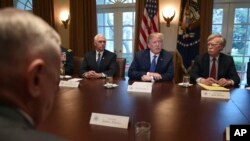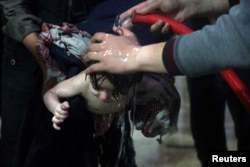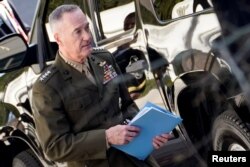Amid a Russian warning that a military conflict could erupt with the United States over Syria, President Donald Trump convened his National Security Council to discuss the American response to the recent alleged chemical weapons attack blamed on the forces of Syrian President Bashar al-Assad.
"President Trump just finished a meeting with his national security team to discuss the situation in Syria. No final decision has been made," White House press secretary Sarah Huckabee Sanders said in a statement. "We are continuing to assess intelligence and are engaged in conversations with our partners and allies. The president will speak with [French] President [Emmanuel] Macron and [British] Prime Minister [Theresa] May this evening."
Before meeting with his top security and military advisers, Trump said a decision would be "made fairly soon."
WATCH: US, Allies Mull Response to Syria's Gas Attack
Focus on military might
Later, during an afternoon event in the White House Rose Garden at which Trump touted an increased defense budget, the president declared that "we're going to have the strongest military we've ever had, and can you think of a better time to have it? Right? This is when we need it."
Amid speculation a U.S.-led strike conducted with several allies on multiple Syrian targets could be imminent, Trump has publicly warned Russia "missiles will be coming to Syria" before insisting on Twitter that he "never said when an attack on Syria would take place."
Russia has called on all parties involved in Syria to refrain from actions that could destabilize the region.
"We hope that there will be no point of no return — that the U.S. and their allies will refrain from military action against a sovereign state. You understand that the danger of escalation is higher than simply just Syria, because our military is there on the invitation of the Syrian government," said Russia's ambassador to the United Nations, Vassily Nebenzia.
'Very bellicose'
Asked about the possibility of war between the U.S. and Russia, Nebenzia said, "We cannot exclude any possibilities, unfortunately, because we saw messages coming from Washington. They were very bellicose. They know we are there. I wish there were dialogue through appropriate channels to avert any dangerous development."
U.S. officials are acknowledging the risk of retaliation drawing Washington and Moscow — both of which have troops in Syria — into direct military conflict.
"We're trying to stop the murder of innocent people," U.S. Defense Secretary Jim Mattis told the House Armed Services Committee on Thursday. But the question on a strategic level, he said, "is how do we keep this from escalating out of control, if you get my drift on that."
According to Aaron Stein, a resident senior fellow at the Atlantic Council, a global policy think tank, "It's very clear that the U.S., the French and the British will strike."
Stein predicted in an interview Thursday with VOA's Russian service that "it's probably coming in the next couple of days and will probably last just a night."
In Moscow, political and military leaders are likely asking themselves, "What does the [U.S.] president want, what is he trying to get the Syrians to do or not do, and what is he trying to get the Russians to do or not do?" according to Yuval Weber, a global fellow at the Wilson Center think tank's Kennan Institute, which focuses on Russia and Ukraine policy research.
"That's essentially where we get the chances for miscalculation and actual serious conflict," Weber, also an assistant professor at Russia's National Research University-Higher School of Economics, told VOA's Russian service.
Security Council session
The Russians, backers of Assad's government, have requested that the U.N. Security Council meet Friday to discuss Syria and that Secretary-General Antonio Guterres brief the diplomats.
At least 40 people were killed and hundreds sickened in last Saturday's attack in the town of Douma, in eastern Ghouta on the outskirts of Damascus. Syria has denied using chemical weapons.
NBC News reported that the U.S. government had received blood and urine samples from the scene that tested positive for chemical weapons.
Inspectors from the international Organization for the Prohibition of Chemical Weapons said a fact-finding mission would start work in Douma on Saturday.
VOA's Margaret Besheer at the United Nations and Jeff Seldin and Iuliia Alieva in Washington contributed to this report.







